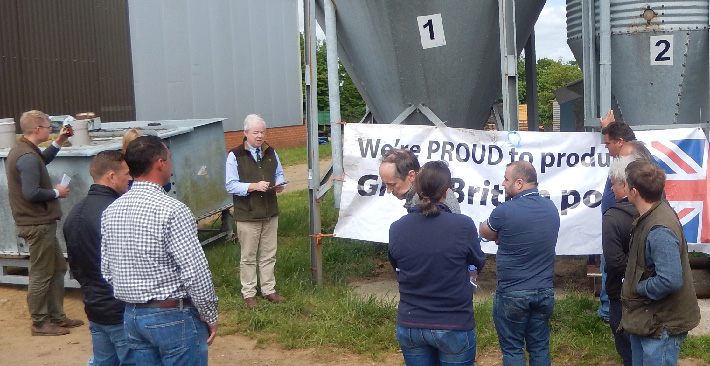Although the SPP continues its slow climb, putting on a further .29p and now stands at 152.79p, it was good to see the German producer price take a significant step forward rather than a slight stumble, which has been the case over the past few weeks, rising by four euro cents and now standing at €1.78.
This is equivalent to 162p/kg in our money – and almost 10p ahead of the SPP – which is the first time in my (long) experience that the German price has been so far ahead of our own.
Despite this, weekly contribution prices have however remained mainly in “stand on” mode with the majority between 143p and 150p bearing little reflection of a stronger euro or higher EU prices!
Spot bacon prices have tended to be in the 145-150p region according to spec but with most pigs on contract, the spot market remains relatively quiet and trade remains selective but like beef and lamb, UK pig meat values are in school report terms a case of “could do better”.
A continuing tumble in the value of sterling is however providing the UK pig industry with something of a dividend and with the Euro trading worth 91.6p which is 2.3% higher than its value 7 days earlier, coupled with the improved German pig price, cull sow values have moved ahead to the tune of 3p/kg and 100p/kg is more of a bottom than a top price.
Signs of a slightly better demand for weaners with the latest AHDB 30kg ex farm average standing at £51.49/head and 7kg most of which are RSCPA Assured at £38.70/head.
The recent blistering hot weather has however led to reports of conception rates suffering so we could be looking at something of a black hole in pig numbers in the months ahead which might help to stimulate demand especially if the Chinese are still out shopping for extra pigs to fill the void caused by ASF in their system, with reports that in June Chinese pig prices rose by 30% and it is just a pity that the UK industry still seems to be receiving very little benefit from the whole ASF situation in the Fat East, but perhaps this is a case of half a loaf being better than no bread!
Feed prices have remained at generally similar levels with ex farm spot old crop wheat averaging £134.20/t compared with £177.40/t a year ago. UK wheat futures prices are generally holding, trading at £147/t for September and barley at £132/t for the same month.
However, reports are indicating that Russian wheat prices might be on the rise due to poor yields in some parts of the country although harvests throughout the UK and Western Europe appear to be providing generally good yields ahead of expectations in most cases, apart from regions affected by freak weather.
Protein prices are still continuing to nudge higher with Hipro soya for September-October traded at £311/t and for November-April 2020, £309/t.
And finally although most of the population were more interested in what’s been happening on Love Island, thoughts must surely soon turn to how Brexit is likely to affect the UK livestock industry especially as far as “no deal” is concerned.
Sheep farmers are particularly alarmed at the prospect of lamb being hit by a 40% levy especially as over 90% of our sheep meat exports are going to the EU.
The NPA have underlined in the media how the UK pork industry could be seriously damaged by a no deal exit by the end of October which is now less than 3 months away.
“Barking Boris” seems to be contradicting Michael Gove’s role in preparing for a No Deal Brexit, and UK pig producers will no longer have the protection of EU tariffs on imports from non-EU countries and according to recent reports, the Government are proposing that these are replaced with much lower tariffs, whereas UK pork exports to the EU which are mainly sow meat, would face much higher tariff levels. Challenging times just around the corner.




